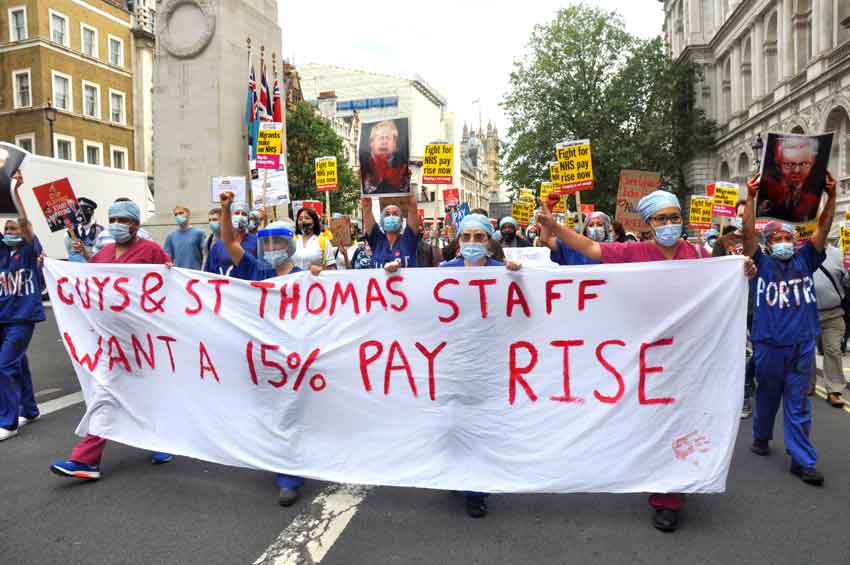

By Rebecca Anderson
HEALTH SECTOR unions are balloting their members over the government’s pitiful pay offer, with rank and file activists demanding a pay award which reverses the years of caps and freezes.
NHS pay has fallen by 15% in real terms since 2010. Yet, the government is offering the 1.2 million NHS staff a 3% pay raise, at a time when inflation is 3.9%.
After decades of decline in real incomes, their ‘reward’ is in fact a pay cut, equivalent to a £200 reduction in purchasing power, according to the Royal College of Nursing.
Hypocrisy
A year ago, Tory ministers were applauding nurses, doctors, and cleaners as heroes and using “Save Our NHS” as a key slogan to inspire the fight against Covid-19. Unions are now demanding pay awards to match the praise.
Unite is calling for 15% or £3,000, whichever is greater, the GMB 15% or £2 an hour uplift, the RCN 12.5% and Unison—bringing up the rear as usual—£2,000 for all pay grades, which amounts to 8% for the lowest paid.
There are 90,000 vacancies in NHS England alone and staff are stretched to breaking point after over a year of work in pandemic conditions.
Low pay in the NHS makes it harder to fill those vacancies, especially as nurses now have to pay thousands of pounds in tuition fees, despite working half their time on the wards.
Mental health problems among NHS staff quadrupled in the first wave of the pandemic. The percentages of staff experiencing depression rose from 5% to 21%, severe anxiety from 8% to 36% and severe stress from 11% to 46%.
While better pay could not have compensated for the stresses of working on the frontline of the pandemic, it would have helped relieve worries over bills and generally enable them to recover from the stresses of work more quickly and fully.
Ballots
The pay campaign has the potential to not only force the Tories to restore health workers’ pay to 2010 levels, but also to encourage workers across the public and private sectors to press for similar claims. Victory would require a united front between all the health unions, who should collectively reject the current offer and unify around the demand for 15%.
It is positive that almost all unions representing health workers, including Unison, the GMB, RCN, and Unite are conducting consultative ballots asking their members whether they should accept or reject the government’s offer. Some unions, like Unison and Unite, are also simultaneously members whether they would be prepared to take industrial action.
If these ballots are successful, union leaderships will attempt to use them to force the government back to the negotiating table. But past experience shows that without a credible threat of actual strike action, their leverage will be limited.
And union leaderships will be reluctant to proceed to a full-scale strike ballot, which in their eyes poses an unacceptable risk of defeat and embarrassment. Ballots for legal industrial action require a turnout of ove 50% of union members with a majority voting yes – a difficult threshold to meet in mass unions which have done little to engage their memberships in recent years.
The union bosses have demonstrated time and again that they will not take such actions willingly. Indeed the pay strikes were demobilised and sold out three years ago, when Unison and RCN leaders deliberately misrepresented a government pay offer to get their members to agree to it.
Strategy
Militants will therefore have a fight on their hands to create a mass membership campaign in support of further action.
Activists must hold hospital and workplace meetings and demand a rank and file presence at the negotiating table. NHS workers must have full access to the details of any offers, as well as the final say about when to launch strikes and when to call them off.
Regular protests outside hospitals across the country (for example every Thursday) can build towards industrial action by bringing together members of the various NHS unions into a joint campaign and demonstrating their strength of feeling. Such actions can also draw in public support and aid the formation of solidarity committees.
The government and media will certainly attack the unions over the threat of strike action, accusing them of trying to break an already stretched NHS as the coronavirus pandemic continues. If any of the health unions do proceed to a formal strike ballot, the bosses will invoke the full force of the anti-union laws to block effective strikes. But concentrated action by local activists, trade unionists and young people can shift public opinion and force the union officials to act.